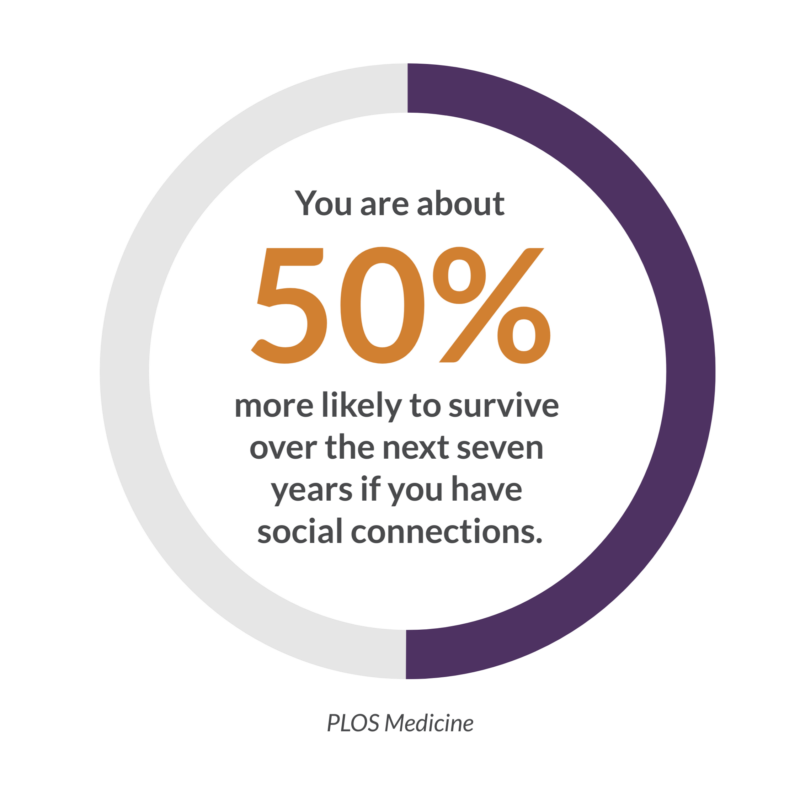By Anna McKenzie
It’s not just you: People across the country are feeling pretty lonely. A post-pandemic report from The Cigna Group reveals that 58% of US adults are considered lonely. But how does loneliness affect mental health? According to the group’s data, lonely people tend to have a greater struggle with mental health issues like anxiety and depression than their less lonely counterparts. So what are some healthy ways to deal with loneliness and overcome mental health challenges?
How Does Loneliness Affect Mental Health?
While men and women seem to be equally as lonely, according to the Cigna research, men are dealing with a crisis of missing social connections. USA TODAY states that for men, close relationships with other men can be misconstrued as something sexual, leaving a lot of men feeling isolated and unable to be vulnerable with their male friends. But intimacy in platonic relationships is important for personal growth and emotional health.
Intimacy in platonic relationships is important for personal growth and emotional health.

So exactly how does isolation affect mental health? According to The New York Times, if research is correct, “social isolation probably kills far more people in the West each year than terrorists and murderers.” It also adds up to “enormous sums in unnecessary health costs” for us all. The Times‘ article also shares research that essentially says you are about 50% more likely to survive over the next seven years if you have social connections.
What are the effects of isolation? They can show up in the following ways, according to the Cigna report:
- Being emotionally or physically unwell more often
- Decreased productivity at work
- Dissatisfaction with your job
- Increased experience of stress, anxiety, or depression
- Greater likelihood of sleep disorders, substance use issues, and weight problems
Isolation can even be a factor in fostering impulses to be violent or act out, according to VCU News. So if social connections are critical to our health, what can we do when we feel lonely?
How to Deal with Being Lonely
While the facts about isolation can’t be ignored, it’s important to recognize a few key points about loneliness:
- Loneliness is common to everyone. It’s not unusual or unique to you. It’s part of life, and you don’t have to feel like a victim of loneliness. “This too shall pass,” is a phrase you’ll want to keep in mind when you feel lonely.
- Loneliness is typically seasonal. Transition, loss, and new phases of life can make us feel very lonely. Everything from starting a new job to losing a loved one can give us an experience of loneliness, but that experience won’t last forever. Accept the changes in life, and you’ll be more ready to endure the loneliness you feel.
- Loneliness can help you grow. It’s hard to be alone with your thoughts, but that’s often the best time to work on getting healthy mentally, physically, and emotionally so you can be in a positive place when it’s time to connect with others again.
If you’ve felt lonely for a while, change your patterns and routine. It’s worth getting a little bit uncomfortable if it means you can have new experiences that may make you feel more connected. You may experience setbacks, but if you stay persistent, you can reap the rewards.
How to Cope with Loneliness in Healthy Ways
When you’re contemplating how to cope with loneliness, you may think about alcohol or drugs to change your mood or distract yourself. But after the temporary relief, substances will only create more problems for you. Instead, you can indulge in healthy ways to deal with loneliness. Here are a few to get you started:
When you’re contemplating how to cope with loneliness, you may think about alcohol or drugs to change your mood or distract yourself. But after the temporary relief, substances will only create more problems for you.
- Rechannel your energy through exercise. If running, walking, or cycling sounds like a chore, join a kickboxing class, a martial arts group, or a pickleball league. Not only will you get to be around other people regularly, but you can learn interesting new skills and release the pent-up emotional energy you’re feeling.
- Adopt a pet. If you have the space and ability to care for a pet, you may find this a great option if you simply need some companionship. According to the National Institutes of Health, interacting with animals can lower stress, reduce blood pressure, and decrease feelings of loneliness.
- Volunteer for a nonprofit or soup kitchen. When you serve others, your perspective changes. Helping others in need is a wonderful way to feel more connected and gain a stronger sense of purpose.
- Take a break from social media and explore new places. According to Harvard Health, taking breaks from social media can make you feel less lonely. When you take your eyes off the screen and start exploring your town or taking walks out in nature, you’ll be more mindful and less prone to toxic introspection.
- Talk to a therapist. Telehealth options have made therapy more accessible, and video chatting with a licensed counselor can be a great first step to feeling less lonely.
Get Help for Loneliness and Mental Health Struggles
At The Meadows Texas, we provide compassionate care for those who are dealing with life-disrupting loneliness, mental health issues, and conditions like seasonal affective disorder. We also treat substance use issues, helping you reconnect with your authentic self and start thriving again. If you or a loved one is struggling, get in touch with us today to learn more about our program and how we can help.

